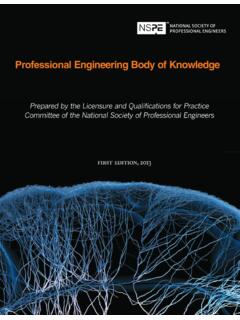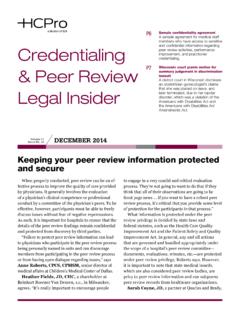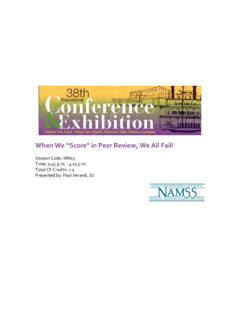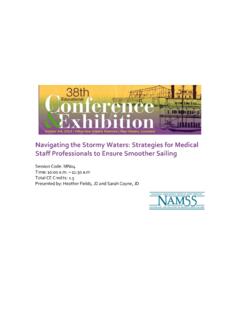Transcription of PEER REVIEW -- CONFIDENTIALITY AGREEMENTS
1 BER Case 96-8 1 APPROVED -- 12/17/96 - Code of Ethics: Engineers having knowledge of any alleged violation of this Code shall report thereon to appropriate professional bodies and, when relevant, also to public authorities, and cooperate with the proper authorities in furnishing such information or assistance as may be required. - Code of Ethics: Engineers shall not disclose, without consent, confidential information concerning the business affairs or technical processes of any present or former client or employer, or public body on which they serve.
2 peer REVIEW -- CONFIDENTIALITY AGREEMENTS FACTS: Engineer A serves as a peer reviewer as part of an organized peer REVIEW program developed to assist engineers in improving their professional practice. When originally selected as a peer reviewer, Engineer A is asked to sign a CONFIDENTIALITY agreement whereby Engineer A agrees not to disclose confidential information involving peer -reviewed firms. As part of a peer REVIEW visit, Engineer A visits Engineer B s firm. Following a REVIEW of the technical documentation in connection with a series of recent design projects involving Engineer B s firm, Engineer A discovers that Engineer B s work may be in violation of state and local safety code requirements and could endanger public health, safety, and welfare.
3 QUESTION: What are Engineer A s ethical responsibilities under the circumstances? DISCUSSION: In recent years, various professions, including groups within the engineering profession, have successfully developed peer REVIEW programs. These voluntary programs have been immensely successful in creating a mechanism whereby professionals in a collegial atmosphere can work with one another in an effort to understand and improve professional practice. This can be accomplished by analyzing and evaluating the actions, decisions, and techniques of the professional and offering constructive and, at times, critical feedback.
4 peer REVIEW enhances professional practice. Copyright 1996 National Society of Professional Engineer (NSPE) . All rights reserved. To request permission to reproduce this NSPE Board of Ethical REVIEW Case, please contact the NSPE Legal Department Case 96-8 2 One of the hallmarks of engineering peer REVIEW programs has been the fact that such programs are built on a foundation of CONFIDENTIALITY , whereby an individual agreeing to serve as a peer reviewer must sign a CONFIDENTIALITY agreement in which the peer reviewer agrees not to disclose information that is revealed to the peer reviewer about the firm being reviewed during the course of the peer REVIEW process.
5 There are sound reasons for such an approach. Firms being peer reviewed should be encouraged to provide as much pertinent detailed information to the peer reviewer to allow the peer reviewer the opportunity to perform a thorough evaluation of the firm, and CONFIDENTIALITY helps to assure that the maximum amount of disclosure will occur. In addition, CONFIDENTIALITY helps build trust between the parties involved in the peer REVIEW process and promotes an atmosphere that will improve the likelihood that the peer REVIEW process will be mutually productive and ultimately successful.
6 While the merits of CONFIDENTIALITY are clear, the Board of Ethical REVIEW is faced with a situation in the present case where Engineer A, the engineer performing the peer REVIEW , discovers that the work of the engineer being peer reviewed, Engineer B, may be in violation of state and local safety code requirements and could endanger public health and welfare. This ethical dilemma appears to involve two separate provisions of the NSPE Code of Ethics -- Section and Section The BER has considered at least one case involving an engineer gaining knowledge of information damaging to a client s interest which involved the public health and safety (see BER Case 76-4).
7 On the one hand, the engineer has an obligation not to disclose confidential information concerning the business affairs or technical processes of any present or former client without their consent. On the other hand, Engineer A, having knowledge of any alleged violation of the Code of Ethics, has an obligation to cooperate with the proper authorities in furnishing such information or assistance as may be required. Weighing the competing considerations in this case, the Board of Ethical REVIEW is of the opinion that Engineer A will have to exercise appropriate judgment and discretion concerning this matter depending upon all of the facts and circumstances.
8 If Engineer A determines that there is an imminent risk of harm to the public health and safety such as loss of life, serious risk of injury to persons or property, Engineer A must immediately take appropriate steps by notifying Engineer B. In the event that Engineer B fails to take appropriate corrective actions, Engineer A may cooperate with proper authorities in furnishing such information or assistance as may be required. While CONFIDENTIALITY is an important ethical value, as a licensed professional engineer, Engineer A s paramount responsibility is to protect the public health and safety.
9 Assuming from the facts that Engineer A determines that Engineer B s work may be in violation of state and local safety code requirements and could endanger public health and welfare, a more appropriate action would be for Engineer A to expeditiously discuss these issues with Engineer B in an effort to seek clarification and early resolution of this issue. If Engineer A and Engineer B are unable to resolve the issue, Engineer A must inform Engineer B that as a professional engineer, his only alternative is to cooperate with the proper authorities as indicated above.
10 CONCLUSIONS: 1. If Engineer A determines that Engineer B s work is or may be in violation of state and local safety requirements and endangers public health, safety and welfare, the appropriate action is for Engineer A to immediately discuss these issues with Copyright 1996 National Society of Professional Engineer (NSPE) . All rights reserved. To request permission to reproduce this NSPE Board of Ethical REVIEW Case, please contact the NSPE Legal Department Case 96-8 3 Engineer B in an effort to seek clarification and early resolution of this issue.















